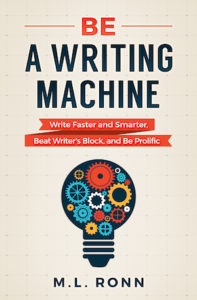Not too many words, but I did meet with two different estate planning attorneys today to talk about my family & author situation.
We had some good conversations about planning for the future and steps I can take now to preserve the legacy of my books and how to keep them in a position of earning income for my family after I’m gone. Most importantly, the attorneys gave me advice on how to avoid leaving a mess.
(And yes, I’ve been focused on this a lot lately. It’s not the sexiest topic, but hey…I’ve gotta learn it sometime. Might as well start now.)
Here are some of the notes I took. I’m mainly doing this to capture some of my thoughts for the next book in the Indie Author Confidential series and my next book on estate planning for authors. Do with this information what you will. None of this is legal advice, but merely info to get you thinking about this.
- When you die, an estate is opened in your name to transfer your assets.
- When you die, your executor has to create a reporting inventory that contains a list of all your assets and their value. That includes any books or copyrights you may own. How do you value your copyrights? No one really knows for sure, and every situation is different.
- An extremely boring and technical guide to valuing your copyright that you can save for a rainy day: https://iccwbo.org/content/uploads/sites/3/2019/06/icc-handbook-valuation-ip-assets-we.pdf
- In many states, the reporting inventory is public record (which is a little scary if you think about it). Do you want everyone in the world knowing what your books are worth after you die? What if one of your books hits it really big and attracts a film studio? Do you want them to know how a court valued the book as they’re preparing your family an offer? Probably an invitation for your family to be lowballed more than usual.
- The reason you have to value your inventory is so that you can put a value on your estate. But it’s also for taxes because when you die, the government is entitled to a portion of your estate, known as estate taxes.
- If you’re not careful, if your book IP is worth more than your estate, then your heirs will have to file for bankruptcy……….
- The value you place on your IP is completely different than what a court will. Courts don’t care about your feelings, and they won’t buy an author’s excuse that a book isn’t worth much. It’s worth whatever they say it’s worth. And your heirs may not like the end result.
- Estate taxes take two forms: state and federal. Iowa for example has an inheritance tax that will be phased out in a few years. Federal estate tax kicks in if your estate is valued at 11.7 million. You should probably figure out what the estate/death taxes are in your state/province/country.
- Every attorney will recommend a will, a power of attorney, and if applicable, a trust.
- Wills and power of attorneys are common knowledge.
- For a trust, one reason one would want to set up a trust is to ensure they’re leaving property and assets to loved ones after death.
- Another reason to set up a trust is because by doing so, your reporting inventory is no longer public record. Therefore, you maintain some privacy. Also, you can transfer your copyrights into a trust and have your family (trustees) manage them. This also applies to royalties/sales commissions. This way, you can control how/who/what/when/where etc. when it comes to the money. You can also ensure that your heirs won’t sell your copyrights on a whim because they need to pay rent (known as squandering).
- But setting up a trust incorrectly and not following legal guidelines can be just as bad as dying without a will and making your family go through probate.
- An attorney will take on average 2% of the value of the estate.
- Quotes I received from a few different attorneys to do wills and a trust was about $500 for a will and $1500 for wills + a trust. Not cheap by any means, but it can save your family in probate costs, which are very, very expensive and can easily land in the thousands.
Anyhoo, I can’t guarantee that any of the information above will be helpful for your situation, but it’s a reminder that there’s a big world out there. You may be focused on just finishing your first book, and that’s the smartest thing to do. The writing life is hard enough without having to think about all this stuff, trust me—and I know that better than anyone.
But at some point, you have to pull your head out of your manuscript and learn the business side of things. If you don’t, you could be damaging the legacy you want to leave as an author.
IN OTHER NEWS
I got the paperback cover for Spirit Chaser (The Good Necromancer Book 3) and got that published.
I also got the cover art for the omnibus collection for The Last Dragon Lord, so I published that on all retailers today. Any day you publish a book is a good day…
I also finished up the majority of my tax prep for 2022. I’m officially ready to go, ready to start getting the 1099s, and I’ll be ready to hit the ground running this year. To say that’s an accomplishment is an understatement considering how disastrous tax prep was for me in 2020 and 2021. I’ve learned from my sins…

